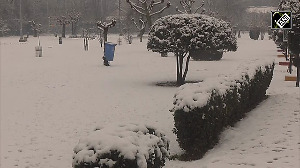Victory in the Uttar Pradesh polls has emboldened the party leadership to pursue a pro-woman agenda, say Sanjeeb Mukherjee and Archis Mohan.

In the 2014 Lok Sabha polls, Narendra Modi led the Bharatiya Janata Party to a famous victory on the back of a narrative that articulated the hopes and aspirations of the youth.
For the 2019 polls, the Modi government believes that as part of its pro-poor focus, it should roll out schemes that help empower women, which the party hopes to cultivate as its dedicated support base.
The BJP’s win in the Uttar Pradesh assembly polls has emboldened the top leadership to pursue a pro-woman agenda.
Prime Minister Modi and BJP chief Amit Shah have acknowledged the role of the Centre’s pro-poor schemes, particularly the Ujjwala scheme, which helped the BJP win the support of women in UP.
Women, as the BJP discovered in its debacles in Bihar and Delhi, and the success in UP, not only comprise half the electorate but tend to vote on women-specific issues.
As part of the Ujjwala scheme, the Modi government plans to distribute gas cylinders to 100 million poor households across the country. Of the 19 million distributed until now, a fourth has been give out in UP.
During their election campaign in UP, both Modi and Shah used to frequently talk about how the Ujjwala scheme has spared women from the torture of cooking on a chulha.
Women, therefore, will be the cornerstone of the schemes to be initiated by the Modi government. It would also help the BJP negate the campaign led by Bihar Chief Minister Nitish Kumar and several activist groups to put pressure on the PM and the BJP to replicate Bihar’s prohibition across BJP-ruled states.
The Bihar CM claims his government’s banning of liquor has found widespread support with women of the state and it has brought down crime and improved health and education of children.
There would be schemes that directly benefit women, like the maternity benefit of Rs 6,000 and Ujjwala. There would be others, such as cheaper foodgrains that should help reduce malnourishment among women and children, and also leave poor households with money to spend on things other than food.
The Ujjwala scheme is set to be rolled out more assiduously in the rest of India, particularly the poll-bound states of Gujarat and Himachal Pradesh.
While there is no consensus in the BJP to use its Lok Sabha majority to push through the over two-decade-old bill to provide for 33 per cent reservation to women in Parliament and state legislatures, there are several other welfare measures the Modi government is set to take to consolidate its popularity among women.
The Centre is unlikely to tinker with the price at which it sells foodgrains through the public distribution system under the National Food Security Act. This would be the second year in succession when the price fixed during the United Progressive Alliance regime for grains sold under the Act would be kept unchanged by the Modi government.
The Act, which was passed in 2013, had fixed the price of wheat to be sold through ration shops at Rs 2 per kg, rice at Rs 3 per kg and coarse cereals at Rs 1 per kg for three years after which the Centre was free to revise the prices.
In 2016, the Centre had extended the order for a year and this is likely to be extended for another year.
A senior government official said there are plans to encourage state governments to bear a portion of the burden of selling foodgrains at cheap rates, so that wheat, rice and coarse cereals, under the Act, are available gratis to beneficiaries.
Already, the Centre bears over 90 per cent of the total expenditure of selling grains to consumers through the ration shops. If states agree to bear the remaining share, the grain can be provided free to beneficiaries.
The ministry of women and child development is working on a programme through which it plans to provide maternity benefit of Rs 6,000 to identified pregnant women and lactating mothers, as announced by the prime minister sometime ago.
The maternity benefit is also part of the NFSA and till now was being implemented on a pilot basis in more than 50 districts, but after Modi’s New Year Eve announcement, the programme has been extended to all the 640 districts in the country.
The scheme, officials said, would be comprehensive, well-targeted and would ensure maximum women drive benefit from it.
IMAGE: Prime Minister Narendra Modi handing out free LPG connections under the 'Pradhan Mantri Ujjwala Yojana'. Photograph: PIB Photos.












 © 2025 Rediff.com -
© 2025 Rediff.com -